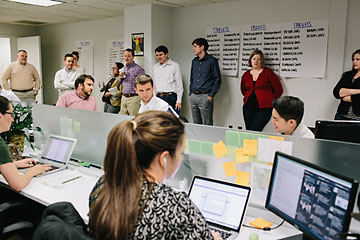
On a cold Saturday in January, a spy slipped into a craft brewery in downtown Des Moines, Iowa, where Hillary Clinton's standing army was huddled in a private room. The 43-year-old operative lurked in the corner with a camera on a tripod, recording the group of old Clinton hands as they plotted her path to the presidency. "Nobody," veteran Democratic strategist Craig Smith told the group, "had ever done it like this before."
Within hours, a clip of the gathering was shipped to the snoop's employer, a for-profit research firm in northern Virginia. From there, it was packaged for a conservative magazine and subsequently went viral online. It was an early score in a presidential election that won't officially begin for another year--and it happened without any involvement from a candidate or either party. The Clintonites were members of Ready for Hillary, a super PAC that is spending millions of dollars to assemble a grassroots battalion for the former Secretary of State's campaign-in-waiting. And the infiltrator was one of more than two dozen "trackers" dispatched across 19 states by a company looking to damage Democrats.
This is the dawn of the outsourced campaign. For decades, elections have been the business of candidates and political parties and the professionals they employed. People with names on the ballot bought their own ads and wielded the ability to smite enemies with a single phone call. But changes in campaign-finance law have atomized the game and sapped the power of party bosses. In a new era marked by unlimited political money, everything from data mining to digital strategy is now increasingly controlled by a band of outside hit squads waging proxy wars. In some ways, the most remarkable aspect of the incident in Des Moines was how routine it has become.
By Election Day 2014, interest groups across the ideological spectrum will have raised more money, run more TV ads and played a greater role in selecting candidates than in midterm elections past. Elected officials, and the parties they control, matter far less. "It's been a shocking evolution," says Scott Reed, who ran the Republican National Committee a generation ago and now serves as chief strategist of the U.S. Chamber of Commerce. "You don't need the party anymore," explains veteran Republican Ed Rollins.
To the outsiders, the migration of money and influence away from the party machines has made the political process more accessible to more people. It has also made it tougher to hold anyone accountable and to track the sources of the cash flooding into elections--and it has made it harder for lawmakers to govern. The surging reliance on outside mercenaries is the "growth industry" of national politics, says Trevor Potter, president of the nonpartisan Campaign Legal Center. "This is a taste of the future."
A Rising Force
The effort to destroy Hillary Clinton's unofficial campaign occupies a spare third-floor suite amid a sea of cookie-cutter buildings in Arlington, Va. The sign on the door reads America Rising, the name of an opposition-research shop that tracks blunders by Democratic candidates and hawks the evidence to Republican campaigns.
